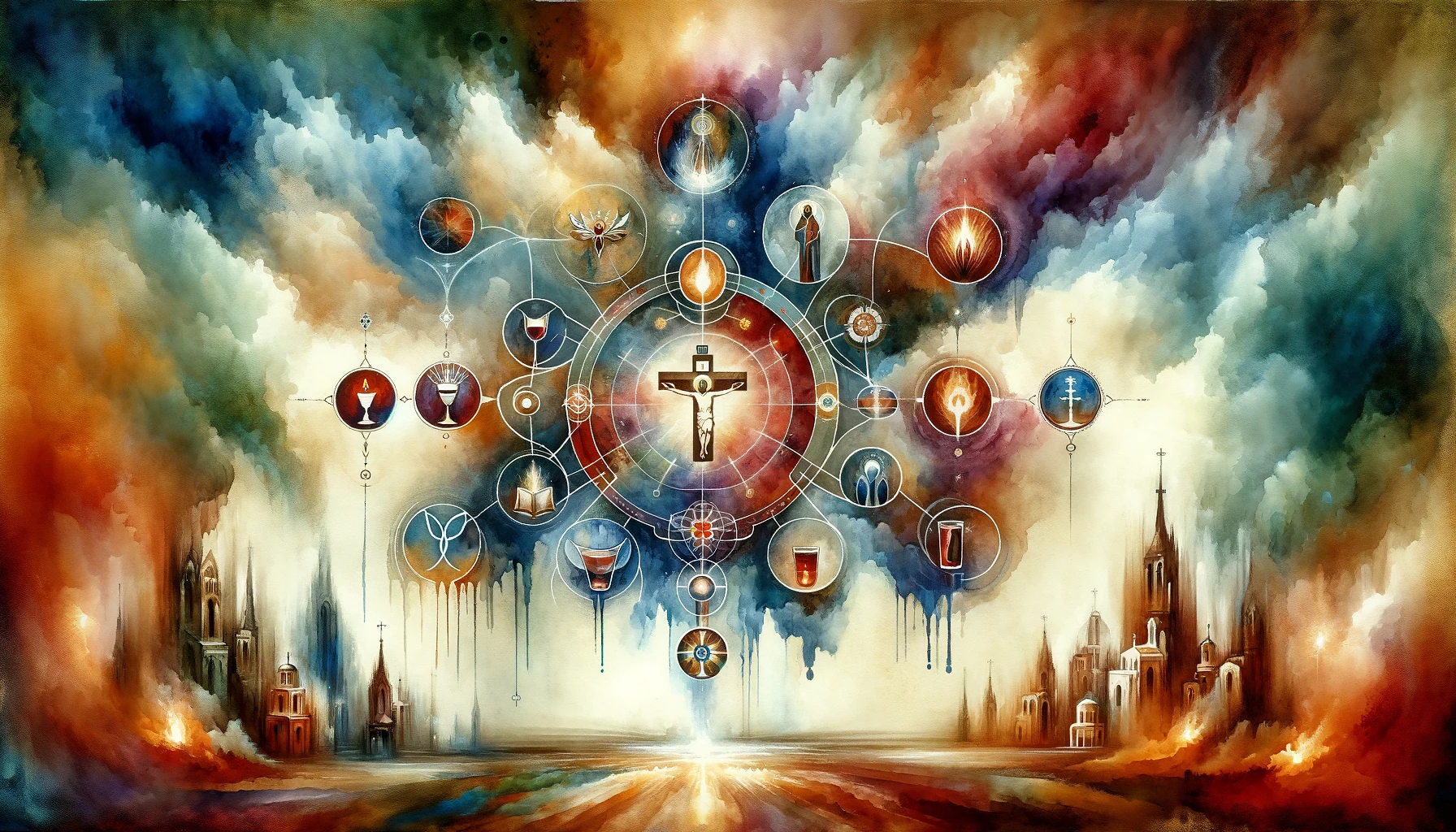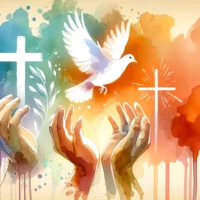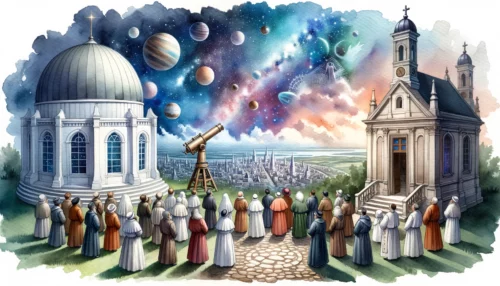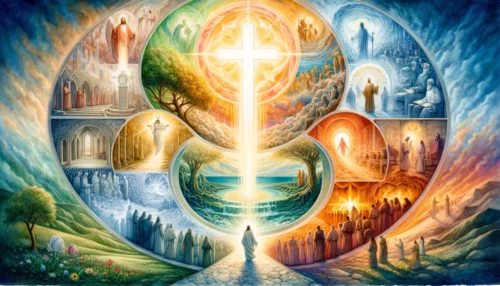Sacraments are pivotal to Christian faith, serving as visible signs of God’s invisible grace. Instituted by Jesus Christ, these sacred rites are means through which believers receive divine grace. But what exactly qualifies as a sacrament, and how many are there according to scripture? This is a question that not only delves into the heart of Christian worship but also invites us to consider the basis upon which we classify these acts as sacraments. Are they merely symbolic rituals, or do they hold a deeper spiritual significance? How does the Bible guide us in understanding and practicing these sacred rites?
Understanding Sacraments: A Biblical Foundation
Sacraments are considered sacred acts of divine grace, instituted by Jesus Christ to nourish and sustain the faithful in their spiritual journey. These rites are more than just symbolic actions; they are means of grace, ways in which God works invisibly in believers, affording them spiritual strength and growth. The concept of sacraments is deeply rooted in Scripture, with Christ himself establishing the precedent for such sacred rituals during His earthly ministry.
The New Testament provides clear instances where Jesus instituted practices that the Church has come to recognize as sacraments. For instance, the Last Supper is seen as the foundation for the sacrament of the Eucharist (Matthew 26:26-28). Here, Jesus broke bread and shared wine with His disciples, commanding them to do this in remembrance of Him. This act was not merely a farewell meal; it was the establishment of a perpetual ordinance, through which believers are invited to partake in the body and blood of Christ, commemorating His sacrifice and experiencing spiritual renewal.
Baptism is another sacrament directly instituted by Christ. Before ascending to heaven, Jesus commissioned His disciples to make disciples of all nations, baptizing them in the name of the Father, and of the Son, and of the Holy Spirit (Matthew 28:19). Baptism, therefore, is not just an initiation ritual into the Christian community; it signifies the believer’s spiritual cleansing, death to sin, and new life in Christ.
These examples illustrate how sacraments are biblically grounded, serving as conduits of God’s grace, affirmed by Jesus’ actions and teachings. Sacraments are tangible expressions of faith, connecting believers to the foundational events of Christianity, such as the death and resurrection of Jesus, and facilitating an encounter with the divine.
The role of the Holy Spirit in sacraments is also crucial, as it is through the Spirit’s power that the grace of God is imparted to believers. The Acts of the Apostles describe how the early Church continued to practice these rites, emphasizing the importance of the Holy Spirit in the life of the community (Acts 2:38-42). Through sacraments, the Holy Spirit works within the hearts of believers, strengthening their faith and binding them closer to God.
Sacraments serve multiple functions within the Christian life. They are not only individual encounters with God’s grace but also communal acts of worship that strengthen the bonds among members of the Church. Through participation in sacraments, believers are reminded of their identity in Christ and their mission to live out the Gospel in the world.
Sacraments, as instituted by Christ and rooted in Scripture, are vital to the Christian faith. They are means by which believers receive God’s grace, marked by Jesus’ own actions during His ministry. Through sacraments like the Eucharist and Baptism, Christians partake in the life, death, and resurrection of Jesus, drawing strength and renewal from these sacred acts. The Holy Spirit’s role is indispensable, activating the grace received through sacraments and fostering community among believers. These sacred rites underscore the believer’s journey with God, embodying the spiritual nourishment and commitment that define a life of faith.
The Number of Sacraments: Tradition and Scripture
The Christian tradition varies in the enumeration and understanding of sacraments, primarily between the major branches of Christianity: Roman Catholicism, Orthodoxy, and Protestantism. This diversity reflects the different theological emphases and interpretations of Scripture and tradition within each tradition.
In Roman Catholicism, there are seven sacraments: Baptism, Eucharist, Confirmation, Reconciliation (Confession), Anointing of the Sick, Holy Orders, and Matrimony. This enumeration is rooted in a comprehensive theological framework that sees sacraments as essential means of grace, necessary for salvation and spiritual growth. The Catholic Church views these seven sacraments as instituted by Christ, each serving distinct purposes and stages in a Christian’s spiritual life, from initiation into the faith to the strengthening of spiritual life and the service of community and God.
The Orthodox Church also recognizes these seven sacraments, with similar theological understandings but different nuances in practice and emphasis. For Orthodoxy, sacraments are mystical means through which believers participate in the divine grace. They are integral to the life of the Church and the believer, encompassing the whole of a Christian’s journey with God.
Protestant denominations, however, vary widely in their recognition and practice of sacraments. Generally, Protestants affirm two sacraments—Baptism and the Eucharist—as instituted by Christ (Matthew 28:19; Luke 22:19-20). These are seen as the primary means of grace and symbols of faith, distinct from other religious ceremonies. Some Protestant traditions may recognize other rites as important but do not classify them as sacraments in the same way as Baptism and the Eucharist.
The basis for the number of sacraments lies in how each tradition interprets Scripture and the traditions of the early Church. While the New Testament does not explicitly list a set number of sacraments, the practices of Baptism and the Eucharist are clearly instituted by Jesus, making them universally acknowledged among Christians. The recognition of additional sacraments by the Catholic and Orthodox Churches is based on the broader understanding of sacramental theology and the Church Fathers’ teachings, which see these rites as deeply ingrained in the life of the Church and the spiritual journey of believers.
The diversity in understanding and practice of sacraments across Christian traditions does not diminish their significance; rather, it highlights the rich theological heritage and the various ways Christians have sought to live out their faith through the centuries. Each tradition brings unique insights into the sacramental life, emphasizing the multifaceted ways in which God’s grace can be experienced and lived out in the community of believers.
The number and understanding of sacraments vary among Christian traditions, with Catholicism and Orthodoxy recognizing seven sacraments and Protestantism typically affirming two. This diversity reflects different theological interpretations and emphases on Scripture and tradition. Despite these differences, sacraments are universally seen as vital means of grace and essential elements of Christian faith and practice, marking significant moments in a believer’s spiritual journey and facilitating deeper communion with God and the Church.
The Role and Significance of Each Sacrament
Each sacrament within the Christian faith serves a unique role and carries profound significance for believers, acting as a means of grace and a marker of key moments in the spiritual journey.
- Baptism marks the entry into the Christian life, symbolizing purification from sin, rebirth, and the initiation into the Body of Christ (Matthew 28:19). It is the foundational sacrament, affirming the believer’s faith in Jesus Christ and incorporating them into the community of faith.
- The Eucharist, or Holy Communion, is the sacrament of ongoing spiritual nourishment. It commemorates the Last Supper of Jesus with His disciples (Luke 22:19-20), inviting believers to partake in the body and blood of Christ. This sacrament is a profound mystery that signifies unity with Christ and the church community, offering spiritual sustenance and grace.
- Confirmation, in many traditions, is the sacrament of the Holy Spirit’s empowerment for life and ministry within the body of Christ. It builds on baptism, affirming and strengthening the believer’s commitment to Christ and His Church.
- Reconciliation, or Confession, provides a means for repentance and receiving God’s mercy and forgiveness for sins. It restores the believer’s relationship with God and the community (James 5:16), emphasizing the continuous need for conversion and God’s readiness to forgive.
- Anointing of the Sick offers comfort and healing grace to those suffering from serious illness or near the end of life. It conveys God’s care and the healing power of the Holy Spirit, offering spiritual and sometimes physical healing, along with the assurance of God’s presence in suffering.
- Holy Orders is the sacrament through which the ministry of deacons, priests, and bishops is conferred. It ensures the continuation of Christ’s mission through the Church by ordaining individuals to serve and lead the community in worship, pastoral care, and the administration of sacraments.
- Matrimony, or Marriage, sanctifies the union between a husband and wife, reflecting the covenantal love between Christ and His Church (Ephesians 5:25-32). It celebrates the mutual love and commitment of the couple, grounding their relationship in God’s grace and blessing.
Each sacrament, in its own way, facilitates an encounter with the divine, strengthening the believer’s faith and commitment. They are not mere rituals but channels of God’s grace, deeply rooted in the life and teachings of Jesus Christ. Through these sacred acts, believers experience the tangible presence of God, drawing closer to Him and the community of faith.
The sacraments serve as vital conduits of grace in the Christian faith, each with a unique role and deep spiritual significance. From Baptism, which marks the beginning of the spiritual journey, to Matrimony, which sanctifies the covenantal love between spouses, these sacred rites enrich the believer’s relationship with God and the church community. They embody the essence of the Christian faith, fostering spiritual growth, communal unity, and a deeper participation in the life and mission of Christ.
Stepping Into Grace Through Sacraments
Sacraments stand as pivotal expressions of God’s grace within the Christian faith, each offering unique encounters with the divine. These sacred acts, instituted by Jesus Christ, not only signify important milestones in a believer’s spiritual life but also serve as channels through which God’s grace flows. They reinforce the believer’s commitment to Christ, enhance communal bonds within the church, and provide spiritual nourishment and strength for the journey ahead. Through sacraments, Christians experience the tangible presence of God, drawing closer to Him and embodying the essence of their faith in daily life.
Key takeaways:
- Sacraments are vital means of grace, instituted by Christ, for spiritual growth and community strengthening.
- Each sacrament serves a unique purpose, facilitating encounters with the divine and marking significant spiritual milestones.
- The diversity in the understanding and practice of sacraments across Christian traditions reflects the rich theological heritage of the faith.
Reflect on Your Faith:
- How do sacraments personally enrich your spiritual life?
- In what ways can you more deeply engage with the sacraments within your community?
- What steps can you take to deepen your understanding of each sacrament’s significance?
Let the sacraments be a lighthouse on your path, guiding you closer to the heart of God. They are not mere rituals but divine invitations to experience His grace, love, and presence in a profound way. May your participation in these sacred acts bring you into a deeper communion with Christ and His church, illuminating your walk with faith, hope, and love.














